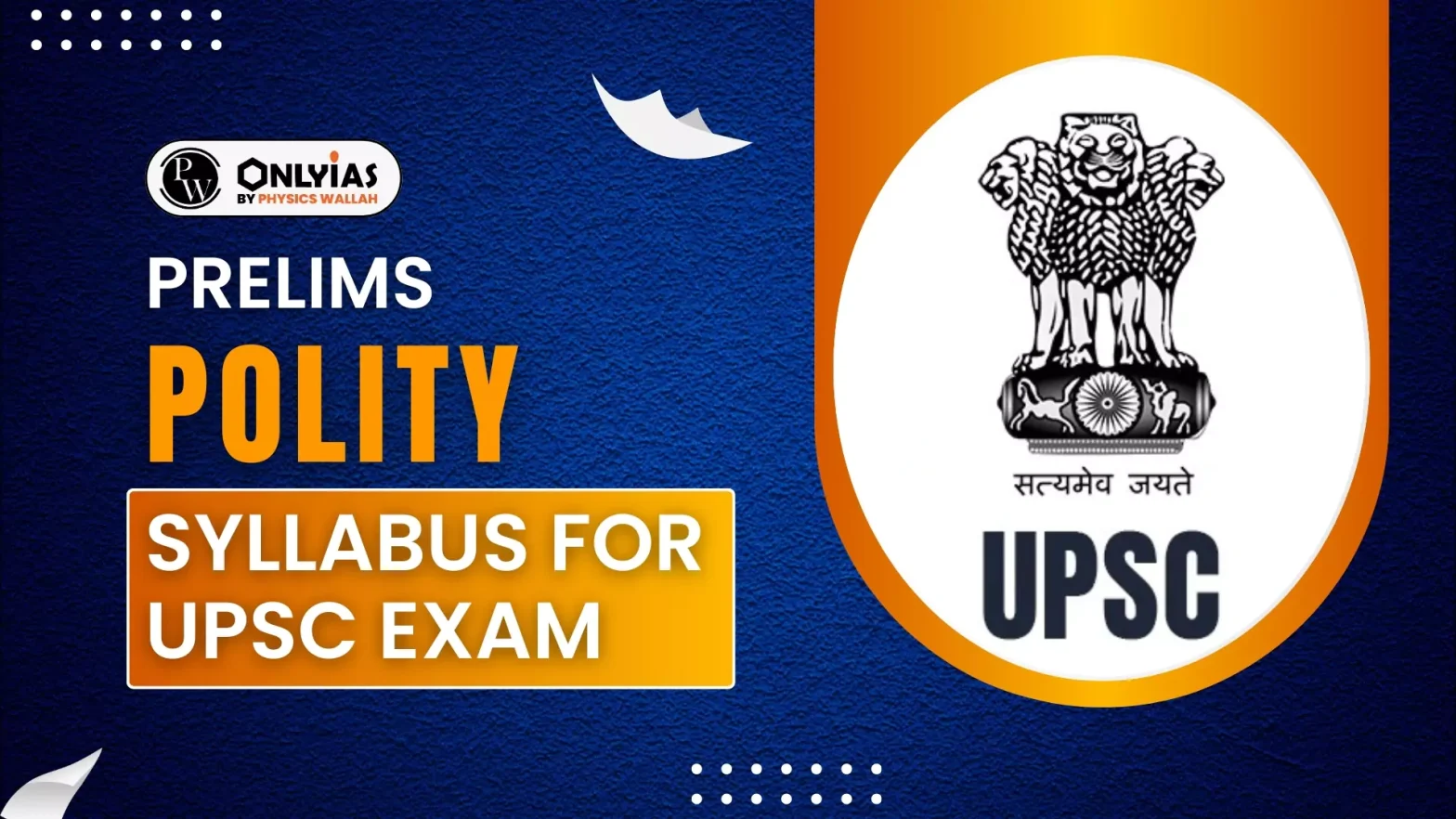Polity Syllabus Prelims 2026 is discussed here. Polity is an essential subject in UPSC exam 2026, having a significant part in both Prelims and Mains, and it is selected as an optional. Check out Prelims Polity Syllabus for UPSC Exam 2026, Booklist, and Previous Year Papers.

Prelims Polity Syllabus for UPSC Exam 2026: Polity is a core subject in the UPSC exam 2026, playing a crucial role in both Prelims and Mains, with the option to select it as an optional subject. In the Prelims, around 15-20 questions are asked annually from key topics in Polity. The syllabus covers areas such as the political system, Indian polity and governance, Constitution, Rights Issues, Panchayati Raj, Public Policy, Centre-State Relations, Judiciary, Legislature, Parliamentary bills, amendments, current affairs, etc. Knowing these topics well is very important to do well in the UPSC Prelims Exam 2026.
The Union Public Service Commission Preliminary Examination, or UPSC Prelims, is the first stage of the Civil Services Examination conducted by the UPSC. The Prelims consist of two papers: General Studies Paper-I and General Studies Paper-II (CSAT), both of which are objective-type multiple-choice exams.
The detailed UPSC Prelims Syllabus 2026 Overview has been presented below:
| UPSC Prelims Syllabus 2026 Overview | |
|---|---|
| Paper | Syllabus/Topics |
| Paper 1: General Studies |
|
| Paper 2: CSAT |
|
|
Click to Know: UPSC Prelims Syllabus 2026 |
The UPSC Prelims Polity syllabus 2026 expects a candidate to know the basics about the Indian constitution, including its origin, features, and many more. Candidates must also study governing institutions and the evolution of laws in the country. The complete detail of the UPSC prelims polity syllabus is as follows:
| UPSC Prelims Polity Syllabus 2026 | |
| Historical Background |
|
| Preamble |
|
| Schedules of Indian constitution |
|
| Background of Indian Constitution |
|
| Union and Territories |
|
| Citizenship |
|
| Fundamental Rights |
|
| Directive Principles of State Policy (DPSP) |
|
| Fundamental Duties |
|
| The Union |
|
| Indian Parliament |
|
| Judiciary |
|
| State Executive |
|
| State Legislature |
|
| Administration of Union Territories (UT) |
|
| Administration of Special Areas |
|
| Centre State Relations |
|
| Emergency Provisions |
|
| Panchayati Raj and Municipalities |
|
| Constitutional Bodies |
|
| Non-constitutional Bodies |
|
| Tribunals |
|
| Special Provisions for Vulnerable Groups |
|
| Current Affairs |
|
| Constitutional Amendments |
|
| Important Articles |
|
To understand the type and trend of questions asked in the Polity section of the UPSC Prelims, it’s important to go through the previous year’s paper. The UPSC Prelims 2025 Question Paper PDF will give you insights into:
The weightage of polity-related questions
Difficulty level of concepts like the Constitution, Governance, etc.
How current affairs are linked with political topics
| Download UPSC Prelims Question Paper 2025 PDF | |
| Prelims Question Paper 2025 | Download Link |
| General Studies Paper I (GS Paper) | Click Here |
Candidates preparing for prelims have to choose books that completely cover the UPSC prelims polity syllabus 2026. The complete booklist of the polity syllabus is given below:
| Book Type | Book Name |
| NCERT |
|
| Reference Books |
|
| Other Sources |
|
| UPSC Polity Related Articles | |
| Indian Polity and Governance Notes | Indian Polity Important Topics For UPSC Prelims 2026 |
On analysis of past question papers, it is clear that UPSC prelims polity syllabus carries significant weightage. The weight of polity questions is as below:
| Year of Preliminary Examination | Number of Polity Questions |
| 2025 | |
| 2024 | |
| 2023 | 15 |
| 2022 | 15 |
| 2021 | 11 |
| 2020 | 17 |
| 2019 | 15 |
| 2018 | 13 |
| 2017 | 22 |
| 2016 | 7 |
| 2015 | 13 |
| 2014 | 14 |
| Enhance Polity Preparation With These Resources | |
| UPSC UDAAN Prelims Wallah | PWONLYIAS UPSC Wallah Polity |
Polity topics must not be studied in isolation, as they are closely linked to each other. Holistic study will allow candidates to understand the concepts in a better way so that they can attempt the questions in a better way.
If you are preparing for UPSC 2026, then don’t delay anymore in preparing with the best guidance and top-notch resources. Join PW UPSC Online Batches today.
Polity carries a weight of 12-17 questions on average in preliminary exams. Answering 10-12 questions correctly can help them reach near the cut-off marks.
Not necessarily.
Yes. A candidate can score good and above-average marks by covering the complete syllabus.
Yes. PYQs give insights into the examiner’s mindset. Analysing PYQs can help candidates identify important themes for exams.
As many times as possible. Candidates who have completed a maximum number of revisions have a high chance of recalling concepts during the exam.
Yes. Candidates who have pre-existing knowledge need not start with basic NCERT. However, new starters can begin their preparation at NCERT and move on to M Laxmikant.
<div class="new-fform">
</div>